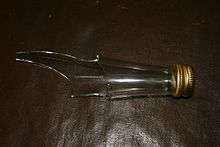Glassing
Glassing is a physical attack using a glass or bottle as a weapon. Glassings can occur at bars or pubs where alcohol is served and such items are readily available. The most common method of glassing involves the attacker smashing an intact glass in the face of the victim. However, the glass may be smashed before the attack, and then gripped by the remaining base of the glass or neck of the bottle with the broken shards protruding outwards. Glassing is easily prevented by using containers made from plastic or tempered glass instead, but they suffer from unpleasant feel (plastic) and higher expense (for tempered glass). These alternative containers are slowly being adopted in areas with a high frequency of glassing, such as the United Kingdom and Australia. In New Zealand, a similar phenomenon is referred to as "bottling".

Common injuries resulting from glassings are heavy blood loss, permanent scarring, disfigurement and loss of sight through ocular injury. In the United Kingdom, there are over 5,000 injuries per year.[1] Glassing is a relatively small portion of all alcohol-related violence, constituting 9% of injuries from alcohol-related violence in New South Wales, from 1999 to 2011, for instance.[2]
Tempered glass as policy response
Australia
At least three states in Australia are addressing glassing incidents by introducing regulations for liquor-licensed venues:
New South Wales
New South Wales introduced many restrictions in 2008, including the removal of glass after midnight for high-risk venues. This has resulted in a significant reduction in the number of glassings.[2]
Western Australia
In response to glassing violence, the government of Western Australia in 2011 made recommendations to the state hospitality industry on the use of tempered glass in hotels.[3] The state government and the Australian Hotels Association created a self-regulatory program on the rollout of tempered glass in pubs, with most hotels and bars expected to change over to tempered beer glasses in six to 12 months.[3] Royal Perth Hospital's head of plastic surgery Mark Duncan-Smith described it as an important step in protecting the public.[3]
Queensland
In relation to continuing glassing incidents despite limited glass bans in Queensland, Australia, state Liquor Licensing Minister Paul Lucas in 2011 predicted that almost all Queensland pubs and clubs would be (standard) glass-free in 10 years.[4]
United Kingdom
In 2000, following a series of glassing attacks in Manchester, Greater Manchester Police and the Manchester Evening News launched a campaign Safe Glass Safe City promoting the use of toughened glass in pubs and clubs to prevent such attacks.[5]
References
- Ian Craig (2002-10-22). "Calling time on pub pint glasses". Manchester Evening News.
- Alcohol-related violence: Is “glassing” the big issue?, October 15, 2013
- Glenn Cordingley (February 26, 2011). "WA leads in fight against glassing with tempered glassware in Perth pubs and bars". PerthNow. Retrieved 2014-04-28.
- Alison Sandy (March 12, 2011). "All pubs set to become glass-free". The Courier-Mail. Retrieved 2014-04-28.
- Ronald V. Clarke and Graeme R. Newman. "Modifying Criminogenic Products: What Role for the Government?". Crime Prevention Studies. 18: 49–51. CiteSeerX 10.1.1.108.2808.
Further reading
- "Surgeon on glass bottle "weapon"". BBC News. 2003-10-24.
- "Glassed". Risky Single Occasion Drinking. BBC News. Archived from the original on June 17, 2005.
- Brian Ferguson (2006-01-03). "Bars face glass ban in violence crackdown". Edinburgh Evening News. The Scotsman.